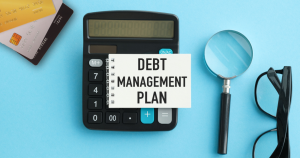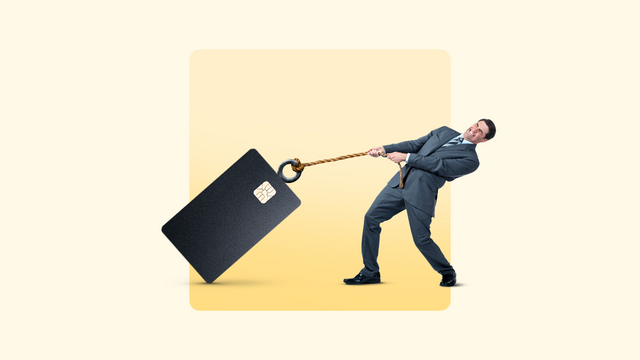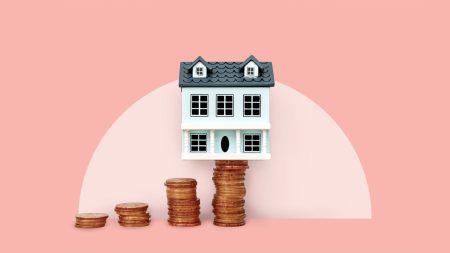Key takeaways
- Credit card debt can strain your budget and impact your credit score, which makes it hard to pay for big expenses or get approved for more credit.
- A credit card debt repayment plan takes budgeting and time. Still, you’ll save money on interest the sooner you pay it off.
- It’s possible to budget for your next big step while still paying off credit card debt.
Credit card debt doesn’t just rack up interest fees — it also comes with opportunity costs. That is, the loss of an experience you don’t get to have because of your debt.
Fifty percent of U.S. adults carry credit card debt from month to month, according to the latest Bankrate Credit Card Debt Survey. Many point to emergencies and day-to-day expenses being the main root of their debt, such as medical bills, car repairs and groceries.
And those Americans dealing with credit card debt might be missing out on education, experiences and life milestones because of their debt burden. However, it doesn’t have to hold you back forever. Here are some examples of the opportunity costs of credit card debt:
Investing in a college education
Taking out a student loan can be a form of good debt because it’s an investment in your net worth. College degrees at all levels tend to increase your income and chances of landing jobs.
But having credit card debt can affect the kind of student loan you can have access to. With a credit card, you might have a high credit utilization ratio (how much of your available credit you’re using) and late or missed payments. And while you can usually get federal students loans at a set interest rate without good credit, you may not qualify for private student loans.
People with poor credit might also struggle to get approved for housing. Plus, paying for textbooks and supplies could mean more credit card debt.
Traveling
If you have credit card debt, it may be because your credit card expenses are greater than your income. But if those expenses are from everyday living, it’s going to be hard to squeeze in extra travel costs without accruing more debt. Nearly half of Americans (47 percent) said in Bankrate’s Summer Travel Survey they plan on taking a summer vacation this year. Of those people not traveling, 65 percent said it was because of affordability.
On the other hand, among those who are planning a summer vacation, 29 percent said they would pay for it with a credit card and carry the balance over multiple billing cycles. While this shows there are some people who aren’t willing to let credit card debt hold them back from traveling, there is a contingent who will simply miss out on travel because of costs.
Having fun experiences
When it comes to dining out and live entertainment (e.g., concerts, sporting events, theater performances), older generations are less likely to take on debt for those experiences than younger generations.
According to Bankrate’s 2024 Discretionary Spending Survey, more than 1 in 5 of Gen Zers (22 percent) and millennials (23 percent) said they’d take on debt to dine out and experience live entertainment.
Fewer than 1 in 10 Gen Xers (9 percent) and boomers (8 percent) said they would go into debt for a dining experience and that number drops more for live entertainment (7 percent for Gen Xers and 4 percent for Boomers).
If you’re already struggling to pay off your credit card balance with everyday expenses, a pricey concert or meal may not be in the cards.
Starting a family
While starting a family and having children can be an exciting new chapter, it doesn’t come without a price tag. Raising a child can cost $313,939 from birth to age 17 as of May 2024, including housing, food, childcare, education and healthcare.
Plus, there are seasonal expenses to having children — from summer vacations to back-to-school to the holidays. But if you’re already using up all your income or allocating it toward credit card debt repayment, the added expenses of parenthood might be harder to cover.
Buying a home
Buying a home is a big step, and it’s good to have your finances in order before getting a mortgage. This includes having a debt-to-income ratio ideally under 36, but it can stretch up to 43 percent, on-time debt payments and a good credit score.
Naturally, these financial factors are affected by credit card debt. It can be hard to get approved for a mortgage, or good mortgage terms, without a good credit history.
Bankrate’s Home Affordability Report reveals that among current American homeowners who have regrets about purchasing their home, 42 percent say it’s because maintenance and other hidden costs are more expensive than expected. If put on a credit card, these hidden costs may only make debt worse.
Launching a business
Like other credit products, taking out a business loan comes with credit score requirements for the borrower. And if the small business doesn’t have an established credit history, lenders might look at the business owner’s personal credit. Once again, credit card debt may leave you with imperfect credit.
How to not let credit card debt hold you back
There’s good news — credit card debt doesn’t have to be part of your life forever. Here are three ways to make debt repayment your next milestone:
1. Know your debt repayment timeline
With a debt repayment plan in place, you can set a timeline for paying it off. Bankrate’s credit card payoff calculator shows you how many months it will take to pay off your debt based on the credit card balance, interest rate and monthly payment.
With a solid plan, you’ll know when you can start thinking about the next milestone, like taking that trip, going back to school or having children.
If you’re still working on your repayment plan, a balance transfer card can get you up to 21 months to work on paying off your balance interest-free. You’ll just want to try to pay off the balance before the intro period ends and the regular APR kicks in.
2. Budget for the next milestone
If you want to be ready for a big life event but can’t pay off credit card debt in time, it’s possible to build that event into your budget as you pay off debt.
When building a budget, start by listing out your sources of income, followed by your necessary expenses like rent and insurance. The money you have left over is what’s available for debt repayment, saving and fun spending.
This is where you’ll have to crunch the numbers. Let’s say you want to budget for an upcoming vacation or a down payment on a home. Decide how much you’ll need and by when. For instance, if you want to take an international trip in one year, you might need $3,000. That’s $250 to set aside for the next 12 months. Can you do that while still making regular payments on your debt? If so, you can navigate both milestones at once.
The money you save might need to be subtracted from your fun money. But skipping dinners out or a new pair of shoes can be worth it in the long-run.
3. Focus on improving where you can
While you may not want to take out more credit if you’re already in credit card debt, there may come a time when you need to rebuild your credit history. That’s when credit cards for bad credit come in handy.
A credit card for bad credit can help you start small, often with a security deposit, and practice good credit habits. Over time, you can improve your credit score and begin to set yourself up for the future — like when it’s time to take out a mortgage or start a business. But until you’re ready to responsibly use a credit card again, it might be best to stick to cash or debit card payments.
4. Don’t be too hard on yourself
While it’s easy to feel overwhelmed by credit card debt, remember that many Americans are in the same boat. And, as started in the debt survey, 71 percent of people with debt think they can pay it off within the next 5 years. No matter how you got into debt, you can work on a plan to get out of it without putting your life on hold.
Sometimes, when people are discouraged by their situation, they’ll start spending more than they can afford to cope with those hard feelings. But this only perpetuates the debt cycle. Instead, set small, achievable goals to maintain a positive outlook on your debt. Consider the gratification that will come once you can afford to start living life to the fullest.
The bottom line
Credit card debt can be a daunting weight on your finances but you can only improve it by tackling it head on. By seeing where your money is going, you can make changes to get out of the debt cycle. It won’t be easy, and it will take some time, but it will be worth it to be clear of credit card debt. It will also help you build habits to keep it that way, improving your relationship with money and your health overall.
If you’re still unsure where to begin, start by reviewing your credit card statements and see where you can start cleaning up your spending.
Read the full article here









